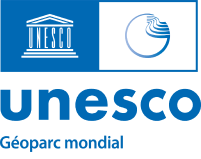In June 2019, the Normandie-Maine Regional Nature Park submitted its letter of intent to UNESCO, expressing its ambition to obtain the UNESCO Global Geopark designation for its territory. After a five-year process, the territory was officially recognised as a UNESCO Global Geopark in March 2024!
Timeline of the application process
The application for the UNESCO Global Geopark label follows a strict procedure coordinated by the Secretariat of UNESCO's International Geoscience and Geoparks Programme (IGGP).
The first step involved preparing a formal application dossier following a defined structure and limited to a maximum of 50 pages. This main document is accompanied by several annexes, the most important being a self-evaluation report prepared by the aspiring Geopark. This report is a key component of the application.
The Normandie-Maine Geopark application was submitted to UNESCO via the French National Geoparks Committee on 22 November 2019. After the dossier was checked for completeness, a geological heritage assessment of the candidate territory was carried out by experts from the International Union of Geological Sciences (IUGS). This evaluation must demonstrate how the candidate territory holds sites and landscapes of international geological significance.
At the end of this process, the evaluators submitted a report to the UNESCO Global Geoparks Council, which met in December 2021. The conclusion of the report, which was accepted by the Council and endorsed by UNESCO, recommended deferring the decision for two years.
A response report addressing the recommendations was submitted in June 2023. The Executive Council then approved the revised application and submitted it for final approval by UNESCO, which granted the label in March 2024.
The label is granted for 4 years
The Geopark will be required to submit a progress report in February 2027, followed by a new evaluation mission in summer 2027. If the evaluation is favourable, the label may be renewed for another four-year period starting in April 2028.
Key recommendations for the next revalidation
- Geopark governance: Consider strengthening the management body to ensure a coherent definition of both the Geopark and the Park. Use the decision regarding the revision of the Park's new charter to guarantee the full integration of the Geopark's existing activities into the Park, and vice versa.
- Geopark partners: Develop a partnership strategy that clearly defines the process and criteria for becoming a partner, while highlighting the related agreements with the Geopark. Consider offering greater visibility to these partners and local producers by using the Geopark's logo and branding, as well as dedicated promotional materials.
- Geopark visibility:
- Draft an overview presenting the region's identity, particularly its geology, in simple, easily understandable language for non-scientific visitors.
- Develop a consistent brand identity for the Geopark across its entire territory (sites, access routes, interpretive panels, media), including the logo, illustrations, and the layout of communication materials and educational activities.
- Ensure the integration of existing museums and tourist centers by applying the Geopark’s identity and branding.
- Consider developing a coherent tourism plan and ensure that it is adopted and implemented by the Geopark's management body.



